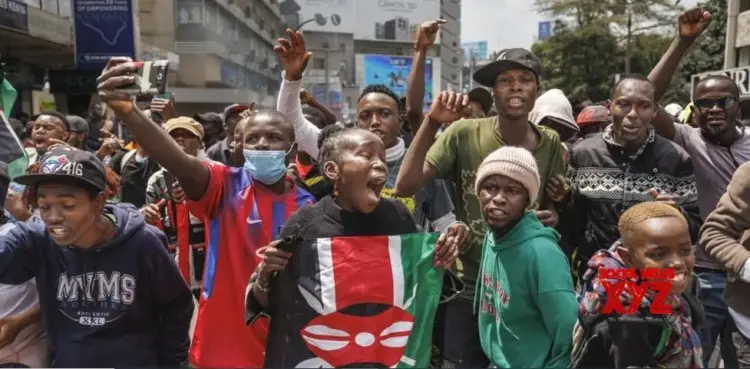Business in Kenya’s capital city of Nairobi came to a standstill as protesters returned to the streets in a month-long defiance to push President William Ruto to carry out reforms.
Blocked roads, tear gas fumes, and burning tyres characterised different parts of the city as police engaged in running battles with protesters, Xinhua news agency reported.
In the city centre, protesters marched along various streets chanting anti-government songs.
Unlike the past protests which turned violent, with some protesters getting killed and others sustaining gunshot injuries, Tuesday’s protests saw police restraint themselves.
“Today we have not witnessed any killings because the police chose to maintain peace. This is what we want to happen every time we protest until our grievances are met,” said Hanifa Farsafi, an activist.
The protesters had threatened to march to Kenya’s main entry point, Jomo Kenyatta International Airport (JKIA) on the outskirts of the central business district.
The government deployed a heavy contingent of police officers, backed by the military, to man the establishment, ensuring that it was not breached.
The airport is Kenya’s main international gateway, located nearly 15 km from Nairobi’s city centre. It is the busiest airport in the Eastern African region and a key hub for travellers connecting to other parts of Africa, Europe, Asia, and America.
Besides fortifying security on the ground, the Kenyan government also intensified aerial surveillance to keep protestors at bay, as they had threatened to shut down the airport.
The security threat saw various airlines issue travel advisories to their customers to avoid inconvenience.
Kenya Airways, the East African nation’s national carrier, informed travellers to arrive at the facility four hours earlier before their scheduled flights due to anticipated disruption.
“Customers are advised to arrive at least four hours before their scheduled flight departure time. Customers are also encouraged to plan extra time to avoid potential delays en route to the airport,” Kenya Airways said in a statement issued in Nairobi.
However, Acting Inspector General of Police Douglas Kanja warned protesters against trespassing in protected areas such as the JKIA.
“Protected areas are out of bounds. They include LPG plants and petroleum depots situated at the Embakasi aviation depot that is JKIA. All unauthorised persons are hereby warned not to trespass on the protected areas,” he said, adding that any person who breaks the law will be dealt with swiftly and decisively.
Kanja noted that the country had witnessed unprecedented loss and a disturbing state of disorder due to the street demonstrations.
“The magnitude of the loss that the country has suffered is evident in the lives that have been lost, the people (both civilians and police officers) that have been injured, property including police vehicles and businesses that have been destroyed, and people that have lost their livelihoods,” he said.
While there were attempts by protesters to march to the airport, they were thwarted by police officers.
Protests were also witnessed on the outskirts of Nairobi, including in Githurai on the west and Kitengela in the south, but security officers curbed them.
Outside Nairobi, protests were recorded in Karatina, central Kenya, Migori, and Kisii in the western part of the country as other places remained peaceful.
President Ruto had on July 20 vowed that he would not allow protests to happen in Kenya again due to the security threat.
“I want to promise it is going to stop. Enough is enough. We will protect life, we will protect property, we will stop the looters, we will stop the killers, we will stop the mayhem, we will stop anarchy because Kenya is a democracy,” Ruto said.
Ruto has conceded to a number of the protesters’ demands, including dismissing his entire cabinet and dropping the controversial new taxes that triggered the crisis.
However, the defiance continues.
More than 50 people have been killed, and 400 others injured since the protests began on June 18, according to the State-funded Kenya National Commission on Human Rights.























